About Your Idealist Temperament
Idealists are spiritual, intuitive people who can enjoy spending a
great deal of time and energy working toward a better understanding of who
they are. The ultimate hope of this group is to attain true wisdom. For
the most part, Idealists are enthusiastic individuals who can find joy
meaningful relationships as well as the world around them. People of this
temperament can pride themselves on being loving, kindhearted, and
authentic. Other fine traits include being more giving and trusting than
many around them. An often-passionate temperament that yearns for romance,
Idealists can make intense mates, nurturing parents, and inspirational
leaders.
<return
to top of page>
Being a Counselor (INFJ)
Counselors like you can be hard to get to know because you're not
the kind to open up easily. On the contrary, you tend not to share your
inner thoughts or powerful emotional reactions about life with anyone but
your most trusted confidants. You belong to a highly private group of
people who have unusually rich, often complicated inner lives. In your own
life, you may sometimes find that friends or colleagues that have known
you for years are still surprised to learn new things about you. This is
probably because you typically reveal yourself to others much more slowly
than most people would. It's not that you're trying to be mysterious or
withholding. You simply prefer to keep a good deal to yourself.
You're the kind of individual who not only enjoys but often needs
your alone time; it recharges your batteries. However, as a Counselor you
also seem to do quite well connecting with both individuals and groups so
long as your interactions together aren't superficial. You can be a great
listener who is truly interested in helping people with their personal
problems. This kindness and positivity is likely well known among those
close to you. In addition to these traits, chances are you also possess
strong leadership qualities. However because the Counselor in you would
prefer to work behind the scenes, your influence may not be so readily
apparent.
Your type tends to work very effectively in organizations. Valuing
staff harmony is an important part of this. More than others, you seem to
know how to use human systems creatively. This makes you good at
consulting and cooperating with others. Having people like you in an
organization can go a long way to ensuring that things run smoothly and
pleasantly. As a manager, you can be a wonderful mentor, sharing your
knowledge in ways that have a ripple effect to the group as a whole.
Whether you're an employee or supervisor, it seems your type is always
concerned with people's feelings. As a result, you can be a great
barometer to measure the feelings and culture within an organization.
Most Counselors are blessed with vivid imaginations. In fact, your
type is often seen as the most poetical of all sixteen. Perhaps you find
yourself using a lot of poetic or vivid language in your own life.
Compared to the people around you, you probably have a great facility with
language-both written and spoken. It's this quality that helps you
communicate with people in such a personal way.
If
you can easily recognize another's intentions or motives, chalk it up to
having a Counselor's are highly intuitive nature. You probably don't even
understand how you've come to read others so adeptly. In some cases this
extreme sensitivity to others could even be the basis of remarkable
ability to experience psychic phenomena.
<return
to top of page>
Work and Career
In
your ideal job, you would be able to embody your beliefs through your
relationships with colleagues. Your sense of reward in the workplace often
comes from either helping others to access their own deepest ideals or for
finding confirmation for your own. You may also focus your efforts on
correcting any discrepancies you see between people's behavior at work and
organizational or human ideals. However, because you're sometimes
painfully aware of your own shortcomings, you're usually reluctant to
impose your values on others. Instead, you tend to seek out or create
environments that naturally support your own vision. If circumstances
arise that demand you to compromise this internal compass, you may become
paralyzed or change direction entirely.
Like other Idealists, you are wired to pursue personal growth,
authenticity, and integrity. You yearn to develop yourself fully as an
individual and to facilitate that growth in others. You tend to thrive
when you can turn your attention to the personal concerns of your
coworkers, clients, and customers - as well as to your own personal
growth.
At Work with the Four Temperaments
At Work with Artisans: Artisans (SPs) are
wired to seize freedom and spontaneity. They hunger for the liberty to act
on their impulses, to play, and to create. They make up about 35% of the
population.
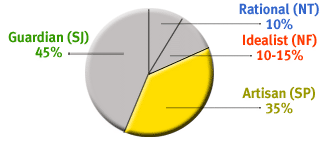
In
business, Artisans are crisis managers and troubleshooters. They can be
expert at solving problems and doing what is necessary, whether they are
expressly permitted to or not. They are practical, resourceful, flexible,
and risk-taking individuals. Coworkers are apt to enjoy their creativity
and verbal wit, but may perceive Artisans as indecisive or even as
troublemakers.
At Work with Guardians: Guardians (SJs) are
wired to seek belonging to a group or community. They often stabilize
relationships and institutions through their responsible, conventional
behavior. They make up about 45% of the population.
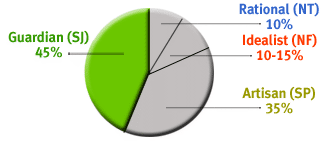
At
work, Guardians tend to be administrators and managers. They can be expert
at doing what needs to be done, and in the manner is must be done. They
are dependable, accountable, realistic, and service-oriented. Coworkers
likely appreciate their desire to belong and contribute, but may perceive
Guardians as being either slave drivers or sticks-in-the-mud.
At Work with Rationals: Rationals (NTs) are
wired to acquire competence and intelligence. Ordinarily, they strive to
learn, know, predict, and control the resources and ideas in their
environment. They make up less than 10% of the population.
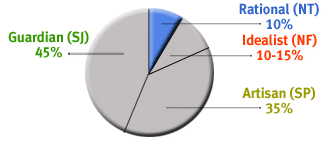
In
the workplace, Rationals are often the researchers and strategists. They
can be expert at conceptualizing and seeing the big picture, as well as
architecting and implementing the necessary systems. They are logical,
precise independent individuals who usually are responsive to new ideas.
Coworkers often appreciate their ingenuity and competence, but may
perceive Rationals as being impersonal and not good with follow-through.
At Work with Idealists: Idealists (NFs) are
wired to pursue personal growth, authenticity, and integrity. They can
yearn both to develop fully as individuals and to facilitate growth in
others. Idealists make up 10-15% of the population.
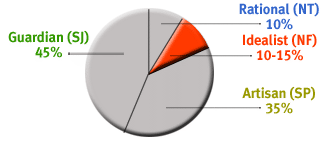
In
work environments, Idealists are usually positive, helpful, and
people-oriented. They can be expert at dealing with the human resource
concerns of an organization, whether these issues are part of their job
description or not. Idealists are warm, idealistic, caring individuals.
Coworkers are apt to appreciate their authenticity and loyalty to the
human side of the business, but may perceive Idealists as not being
effective enough or even of being flaky.
Tips to Help You Find the Right Workplace
- Try to
seek out an aesthetically pleasing, personal, and democratic environment
in which you and your co-workers are free to be yourselves and to build
friendships.
- Be wary of
career moves that take you away from the core of what you love or
compromise your strong ideals.
- Don't
underestimate the value of life experience you picked up outside the
parameters of formal schooling or paid work. Give yourself credit for
all of your talents.
- Consider
creating your own job.
In general,
as an Idealist, you're part of a pretty satisfied bunch when it comes to
work. About 75% of Idealists are either extremely or somewhat satisfied in
their current positions. This contentment doesn't appear to be related to
flexible schedules, lucrative stock options, altruistic practices,
allowing pets in the workplace, or even company-sponsored parties on
Fridays. Having challenging work seems to tip the scales a little bit.
However overall, Idealists like you simply seem to like what they do. With
this statistic in mind, it appears that career choice in itself will be
the key to your workplace happiness and success.
<return
to top of page>
Love and Relationships
You typically
appreciate the rewards that come from serious connections much more than
those derived from casual dating or non-intimate socializing as a couple.
In love, you're seeking your soulmate. You're apt to want the kind of
partner who is willing to be, in Rilke's words, "a guardian of your
solitude." Your own vision of life is clear and complex, and you assume
that your mate is, or wants to be, similarly centered. That's not to
suggest you're looking for a self-centered mate. Quite the opposite is
true.
However, like
all types, at times you're apt to be drawn to the very qualities in others
that you feel you lack yourself. As a result, types who are more
happy-go-lucky can be very attractive to you. Chances are, you admire that
they seem free from the inner complexity that is both a blessing and a
curse for you. During the early stages of relationships, the differences
between you and your mate are likely to be especially endearing and fun.
Your Compatibility with Other Temperaments
Idealist (NF)/Artisan (SP): Idealist/Artisan
pairings are likely to be imaginative romps, marked by freedom,
spontaneity, and sensual pleasures. However, these couples don't always
see eye to eye as Idealists are typically focused on self-realization
while Artisans have little patience for exploring their inner lives.
Idealist (NF)/Guardian (SJ): Idealist/Guardian
pairings can be true-blue partnerships focused on comfort, stability, and
mutual dependability. Also, because Guardians and Idealists are usually
law-abiding types who believe in following the rules, they can make a good
match. Problems may arise at times because Idealists' morals and values
tend to waver more than their Guardian mates'.
Idealist (NF)/Idealist (NF): Idealist/Idealist
pairings can be result in deep and meaningful love because Idealists often
find tremendous satisfaction in sharing each other's inner world and
exploring their mutual personal development. In essence, each partner
helps the other along the road to self-knowledge. However, if the couple
is too much alike the relationship risks becoming narrowly focused or even
boring.
Idealist (NF)/Rational (NT): Idealist/Rational
pairings can be highly satisfying relationships based on exploring the
world of ideas. Imagining possibilities - whether romantic or pragmatic --
and creating dreams for the future can represent the epitome of quality
time for this pair. However, conflicts can occur if either partner's
closely held ideals don't match those of the other.
<return
to top of page>
Famous Counselors
Did you know
that Mohandas Gandhi and Eleanor Roosevelt were both INFJs too? It's not
so surprising when you think about it. As an activist and lawyer during
the early 20th century, Gandhi worked to assure India's independence from
Great Britain and to resolve conflicts between the Hindu and Muslim
factions in his country. His remaining legacy is equally appropriate for a
Counselor, as Gandhi is known for embodying teachings of nonviolence.
First Lady Eleanor Roosevelt showed herself to be a natural Counselor as
well. She went on vast lecture tours, traveling more than any first lady
before her. During her time, she chaired the United Nation's human rights
commission and lived by her motto that, "It's better to light a candle
than to curse the darkness."
<return
to top of page>
What Each Letter Means
The pair of
letters are E-I, S-N, T-F, and J-P. No single letter should be taken as
naming a type of person. For example, there are no "Extraverts" or
"Thinkers," as such. A personality is a complex union of traits. These
letters merely suggest stronger or weaker tendencies in a person's overall
makeup. The pairs of letters stand for the following qualities:
| E =
Extraversion |
I =
Introversion |
| S =
Sensation |
N =
Intuition |
| T =
Thinking |
F =
Feeling |
| P =
Perception |
J =
Judgment |
The terms Extraversion (E) and Introversion (I) describe two vastly
different social styles. People who score high in Extraversion on the
Temperament Sorter tend to be gregarious and expressive; those scoring
high on Introversion tend to be private and reserved.
People strong
in Extraversion are typically more comfortable socializing with groups
than being alone. They often report that they're energized by contact with
other people. These individuals usually have a large circle of friends and
are happy to approach others, even strangers, to talk. For people high in
Extraversion, social banter is usually an easy and pleasant thing.
Interaction is something that makes them feel alive. As a result, too much
quiet and seclusion can actually exhaust such persons. They tend to report
feelings of loneliness or power drain when not in contact with others.
On the other
hand, people prone to Introversion often seem more comfortable alone than
in a crowd. They tend to draw energy from private, solitary activities,
including reading, listening to music, and working by themselves on their
latest project or favorite hobby. Introverts usually have a few, long-time
friends, and can remain in contact with larger groups only so long before
their energies are depleted. If their job, family, or social
responsibilities require them to be outgoing or take center stage, they
can soon become exhausted and need down time in quiet places to rest and
recharge their batteries.
Remember,
however, that no one is simply an "Extravert" or an "Introvert." These
terms are merely end points on the E-I scale, with most everyone falling
somewhere in between. Most individuals embody a mixture of these two
social styles. Also, different tasks or roles at work or in the family can
bring out more Extraversion or Introversion in a person. This dimension of
personality, more than the other three, is fluid and situational.
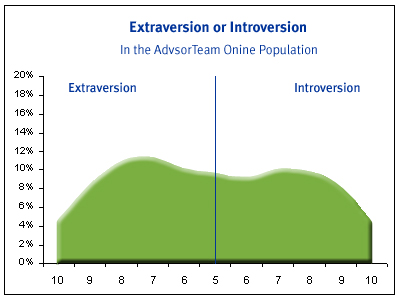

The
Sensory/Intuitive (S-N) scale on the Temperament Sorter
differentiates between two distinct kinds of human focus. People with high
Sensory scores pay more attention to what is going on outside themselves
in the world of concrete things; people with high Intuitive scores pay
more attention to what is going on inside themselves in the abstract world
of ideas.
Sensory
people make up the vast majority of the population -- upwards of 85%.
These people seem more at home in the material world, where they spend
their time looking after the business of everyday living: food and
clothing, transportation and shelter, job and family, recreation and
social life. With their eye on physical realities, they tend to see all
the particulars of what is right in front of them. They typically focus on
what's happening in the here-and-now, or what has happened in the past,
rather than speculating about future possibilities. These are practical,
down-to-earth people who want facts, trust facts, and remember facts. They
believe in common sense and usually trust that experience is the best
teacher.
In contrast,
people who are strongly Intuitive seem more at home in the abstract,
conceptual world of ideas. Intuitive types deal in inferences, theories,
daydreams, musings, speculations, and symbols -- things that can only be
seen with the mind's eye. In fact, because they're so often focused on
their internal world, these individuals can sometimes miss a great deal of
what's going on around them. For highly Intuitive people, reality is not a
solid, present thing, but is more a mental image or a stage of development
toward some future ideal. The possible almost always looms large for
Intuitive people: whatever "is" can be better. They can be fascinated by
hypotheses and potentials. They are also often absorbed by their vivid and
complex imaginations. The S-N scale measures the most fundamental of the
four dimensions of personality. It's the first cut, so to speak, in
evaluating one's type.
However, this
delineation doesn't mean that being Intuitive or Sensory is an "either-or"
proposition. Intuitive individuals certainly turn outward at times and pay
attention to the world at large; they're just far more inclined to become
preoccupied with their own ideas. So too, Sensory people do sometimes look
inward to ponder and to dream. However, for the most part their flights of
imagination lag well behind their real-world observations. Neither type
can occupy both worlds at once, and each will usually show a clear
preference for one over the other.
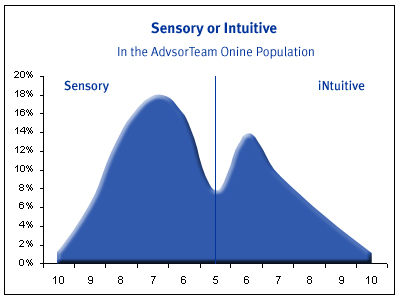

The
Thinking/Feeling (T-F) scale assesses how people govern themselves and
make decisions. Everyone has both thoughts and feelings. However those who
score high on Thinking tend to use their head more when making choices,
while those scoring high on Feeling tend to follow their hearts.
People
falling on the Thinking end of the scale tend to be more comfortable
basing their actions on impersonal, objective factors. Thinking people can
be critical and exacting, both with themselves and others. They're often
convinced only by hard data and sound reasoning. Individuals who scored
highly in Thinking tend to be frank and straightforward. They are the kind
of people who are usually willing to speak their minds and stick to their
guns, even if it causes conflict with others. They're known for being
tough-minded in their decisions, preferring to keep emotions and desires
out of the process as much as possible. Thinking types do have powerful
feelings, but a strong show of emotion can embarrasses them. As a result,
they'll usually keep their feelings in check rather than appearing to lose
self-control, even at the risk of seeming hard-nosed or cold.
In contrast,
people on the Feeling end of the scale are typically more comfortable
basing their actions on personal, emotional factors. When considering
their course, this type will consult their feelings first and will almost
always show concern for others. For the most part, these individuals are
sympathetic and sentimental. As a result, many times they can be swayed by
powerful desire or a touching appeal. Feeling people tend to be
softhearted when making decisions. They don't like to hurt anyone's
feelings. It's not that Feeling individuals necessarily have more or
deeper emotions than those on the Thinking end of the scale. They simply
let their feelings show more easily. This tendency makes them seem warmer
and friendlier, which in turn can give them an easier time getting along
with others.
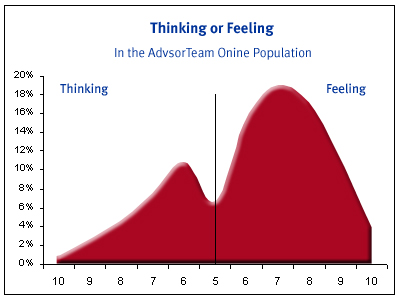

The
Judgment/Perception (J-P) scale measures how people process information
and arrange their lives. Those who score high on Judgment tend to make up
their mind quickly and commit to schedules, while those scoring high on
Perception prefer to keep their options open and their timetables
flexible.
People strong
in Judgment waste no time forming opinions or drawing conclusions. They
often report feeling a sense of urgency until a decision is made, and can
rest only after everything is settled. Closure and finality are important
to these individuals, as is orderly procedure. As a result, they can be
quick to make schedules, agendas, or timetables for themselves and others
to follow. People strong in Judgment will establish deadlines and take
them seriously, expecting others will do the same. They're usually
comfortable with routines and can be willing to do all sorts of
maintenance and cleaning up after a task, feeling that these are necessary
steps for a job's completion. For this type, neatness counts. They usually
feel unhappy or unsettled when their personal space is a mess.
Straightening things up is often near the top of their list.
For their
part, people given to Perception keep their eyes open to what's around
them, gathering information and looking for opportunities and alternatives
that might be available. They usually feel no hurry to nail things down or
settle on a finished product. Instead, they tend to prefer exploring
possibilities. These individuals are often playful and spontaneous in
action. Schedules can make them feel hurried and over-controlled; they
tend to look upon deadlines as mere reminders to get on with the job.
Also, People high in Perception prefer their work to be enjoyable and
meaningful. If a task of routine maintenance or clean up falls to them,
they may balk at doing it, or may leave it to someone else. Easy-going,
even somewhat impulsive, these people are usually quite tolerant of mess.
Their personal spaces are often cluttered with an assortment of things
they've picked up, used, then dropped and forgotten about.
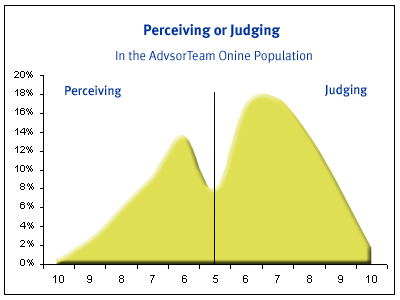

<return
to top of page>
Frequently Asked Questions
What is temperament?
There are two
sides to personality: One is temperament and the other is character.
Temperament is a set of inclinations we are born with, while character is
a set of habits we acquire as we grow and mature. Character is
disposition, developed over a lifetime; temperament is predisposition,
hardwired in from birth. Thus, those of the Artisan temperament are
predisposed to impulsive action, those of the Guardian temperament to
responsible service, those of the Idealist temperament to personal
development, and those of the Rational temperament to objective analysis.
Each type of person, unless blocked or deflected by an unfavorable
environment, will develop the habits of character appropriate to his or
her temperament.
Put another
way, our brain is a sort of computer that has temperament for its hardware
and character for its software. Our hardware is the physical base of our
personality, placing on each of us an unmistakable temperament signature,
some facets of which can be observed from a very early age. Our software
on the other hand, is made up of our individual experience and social
environment -- the forces around us that, with time and occasion, give
shape to our individual character.
Thus
temperament is the inborn form of human nature and character is the
emergent form that develops through the interaction of temperament and
environment. Personality, your unique personal style, is a combination of
the two.
How can the Temperament Sorter help me?
Fundamentally, the Temperament Sorter helps you to do two things:
Understand your own temperament, and gain insight to other peoples'.
Possessing this valuable knowledge of human nature can have a variety of
far-reaching effects on your life.
In the work
world, being savvy about your temperament can lead you to a clearer
understanding of your natural role and functions within an organization.
It can also help you better capitalize on your personal strengths to build
your success. By comprehending your coworkers' temperaments and how each
temperament relates, you can begin to master your interactions with
supervisors and staff. In addition, being able to interpret others' innate
styles can help you to meet their implicit expectations, as well as
increasing your own leadership abilities.
In your
personal life, being knowledgeable about temperament can help you build
strong, lasting ties with others. This is true because it aids you in
anticipating your loved ones' needs and respecting their different ways of
dealing with life. When you are responsive to others, you will naturally
be looked upon as dependable, responsible, helpful, and empathetic. These
are all wonderful qualities to bring to your personal relationships. In
addition, coming to terms with your own temperament and innate tendencies
can bring new levels of wisdom and self-knowledge to all of your
interactions, as well as identifying how your particular temperament
impacts and influences others.
<return
to top of page>
¡@ |
